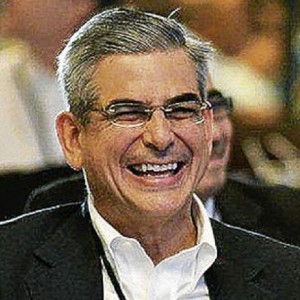MANILA, Philippines–The Philippines needs to address its “infrastructure backlog” to meet the demands of a growing economy, Ayala Corp. chair and CEO Jaime Augusto Zobel de Ayala said on Monday at the Asia-Pacific Economic Cooperation (Apec) Informal Senior Officials Meeting (Isom).
During one of the sessions of the two-day Apec Isom at Makati Shangri-La, Zobel called for massive infrastructure spending both on the part of the government and the private sector.
“Based on the recent global competitiveness report of the World Economic Forum, the Philippines ranks 91st out of 144. It is moving up quite quickly, probably the fastest. But, from an infrastructure point of view, and in terms of the quality, it is still low compared with Apec-related countries,” Zobel said in his speech.
The meeting drew some 400 delegates from the Asia-Pacific region.
Catching up
Zobel noted that should the Philippines follow the World Bank’s advice, it should be spending 5 percent of its gross domestic product (GDP) on infrastructure development to catch up with its regional peers.
“However, data show that the average spending since 2009 was only 2.2 percent of the GDP,” Ayala’s CEO said.
“Clearly, significant work is needed to address the country’s infrastructure backlog. As an illustration, 63 percent of our population lives in highly dense areas because of the massive urbanization that naturally accompanies rapidly growing economies,” he said.
The government said it planned to spend P404.3 billion on new roads, bridges and other infrastructure projects this year. The amount is equivalent to 3.1 percent of GDP.
It aims to boost public infrastructure spending to at least 5 percent of GDP by 2016, up from less than 3 percent in 2013.
While the government was giving a boost to its infrastructure programs, he acknowledged, however, that it was not enough to meet the country’s infrastructure needs.
“The private sector could be a significant contributor to help bridge the country’s infrastructure gap whether through direct private investments or private-public partnership programs,” he said.
Zobel cited Ayala’s efforts to resuscitate the water industry since 1997 when the government privatized distribution in Metro Manila and nearby areas.
Ayala-led Manila Water is the concessionaire for the east zone of the Metropolitan Waterworks Sewerage System. Maynilad is the concessionaire in the west zone.
“Privatization of water distribution was an example of how the public and private sector can work together to deliver services,” Zobel said.
PPP program
Only five infrastructure projects under the PPP program of the Aquino administration were expected to be finished by 2016, executive director Cosette V. Canilao of the Public-Private Partnership (PPP) Center said in October.
These include the two school projects worth P20.14 billion, the P1.72-billion Automatic Fare Collection System for the Light Rail Transit and Mass Rail Transit systems, the P2.01-billion Daang Hari-South Luzon Expressway link road and the P15.52-billion Ninoy Aquino International Airport Expressway.
Among the PPP projects awarded to Ayala Corp. and partner Metro Pacific Investments Corp. this year were the $38.2-million automated fare collection system for Metro Manila’s elevated railways and the P65-billion LRT 1 Cavite extension.
However, the awarding of the Cavite-Laguna Expressway, in which the Ayala and the Aboitiz group had the highest complying bid, was stalled after President Aquino ordered a rebidding of the project next year.–With a report from Inquirer Research
RELATED STORIES
Infrastructure, innovation, information for inclusive national growth
Infrastructure tops wish list of investors


